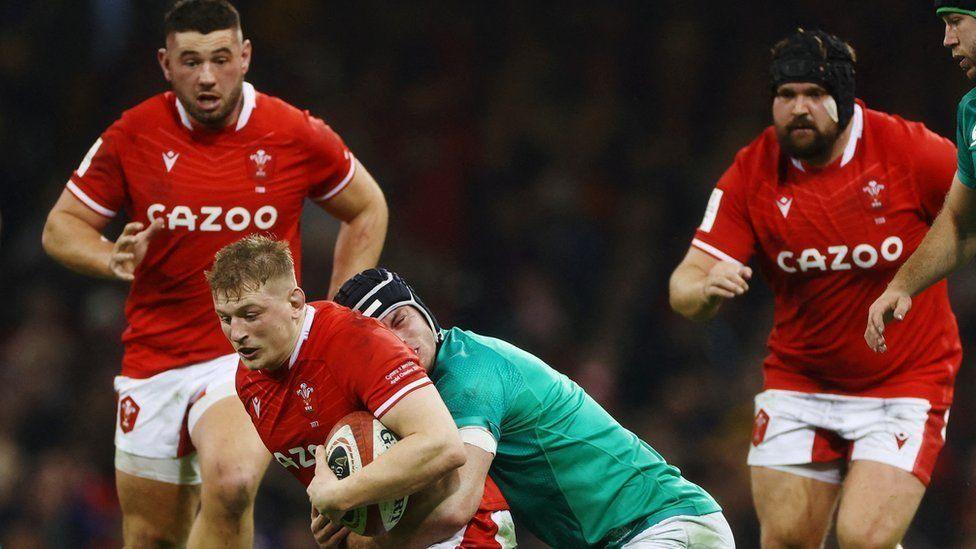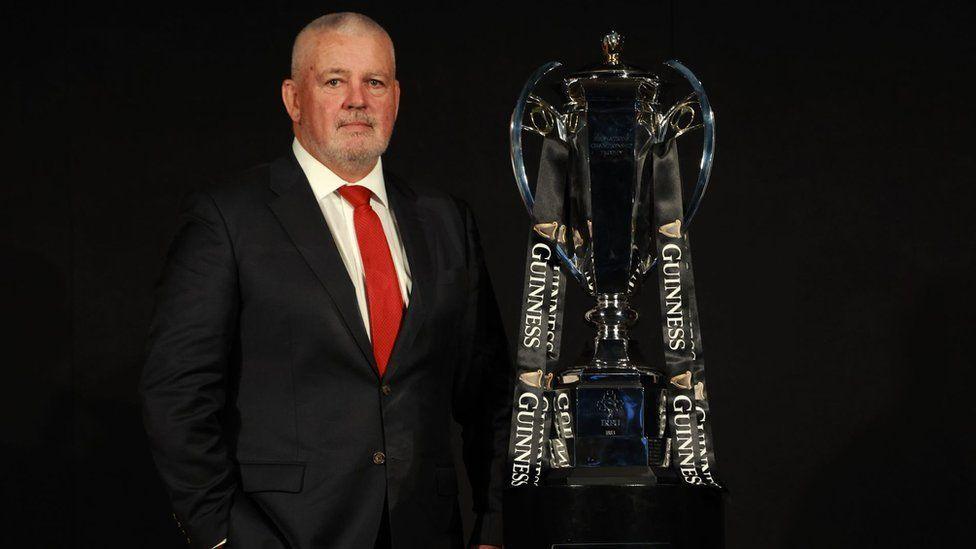Senedd inquiry backs Six Nations pay TV ban calls

The Six Nations is not currently on the free-to-air list of live sporting events
- Published
Six Nations rugby matches should join a list of protected free-to-air live televised events, a cross-party Senedd inquiry has concluded.
It would mean the tournament, like the FA Cup Final, the Olympic and Paralympic Games, would be prevented from going behind a paywall.
Culture and Sport committee chair Delyth Jewell, who led the review, said it was "essential" that the Six Nations "stays as accessible as possible”.
But the inquiry was told that ruling out the pay TV option would be "devastating" for the Welsh Rugby Union (WRU), which would "struggle to survive".
The woman aiming to change Welsh rugby
- Attribution
- Published18 August 2023
New guidance for ministers after WRU sexism scandal
- Published8 February 2024
How did we get here?
There are fears live Six Nations matches could become subscription only once a BBC and ITV deal ends next year.
Broadcasting is a matter for the UK government and is not devolved to Wales.
The Senedd committee's report, published on Thursday, calls for the Six Nations to join the group A category of listed events, under the 1996 Broadcasting Act.
Group A events - which also include the Rugby World Cup final, the football World Cups and European Championships as well as the Wimbledon tennis finals - must be offered to free-to-air TV channels such as the BBC, ITV or Channel 4 on "fair and reasonable terms".
Currently the Six Nations sits in group B, meaning it can go behind a paywall provided free-to-air highlights are broadcast.
Last October a UK Conservative minister said that, if the Senedd could make a strong case for free-to-air protection, then "the matter was not necessarily closed".
Later that month MPs on Westminster's Welsh Affairs Committee called for such protection, while in January the Senedd unanimously agreed a Welsh Conservative motion calling for a paywall ban.
That came a week after the UK government clarified its position and rejected such a move, saying the "current list of events works well to deliver the best outcome" and "strikes an appropriate balance".
The inquiry's report, published on Tuesday, also calls for protection for live Welsh language broadcasting of the tournament.
'Damaging effects'
Speaking on behalf of the committee, Ms Jewell said rugby in Wales "plays a unique role in our national life" and "the Six Nations holds a special place for Welsh audiences".
“We’ve heard loudly and clearly about the challenges the sport faces, in terms of reduced playing numbers in Wales," she said.
"Concerns have equally been raised with us about the effects of placing the tournament behind a paywall and the impact that could have on playing numbers – we were told that ‘if you can’t see it, you can’t be it’."
The Plaid Cymru Senedd member referred to what she called the "damaging effects" of cricket going behind a paywall in 2006.
"Between 2006 and 2015, there was a 32% reduction in playing numbers," she said. "The same cannot be allowed to happen to rugby.
“Growing up, young people in Wales are inspired to take part in sport by watching rugby and it’s essential that the Six Nations tournament stays as accessible as possible.”
Welsh Conservative shadow sport minister Laura Anne Jones said calls for the Six Nations to stay free-to-air were "only growing".
“The Welsh Conservatives have led the way in uniting the Senedd behind keeping the Six Nations free-to-air so that nobody in Wales is left out from those special moments in our national story," she said.
“We will ensure that everyone in Wales can be part of the Six Nations.”
But Plaid Cymru criticised Tory UK ministers at Westminster for making a "short-sighted decision not to designate the Six Nations Championship as free-to-air".
Heledd Fychan, who speaks for Plaid on culture, said that decision "perfectly incapsulates why broadcasting must be devolved to Wales".
"We must be able to make decisions to safeguard our culture and language,” she added.

The Six Nations is on free-to-air TV until at least 2025
In February, WRU chief executive Abi Tierney told the committee's inquiry that putting live Six Nations coverage on the protected list could be devastating for rugby in Wales.
She said some £20m of the WRU's annual revenue came from media rights, out of a total of around £90m.
That is "not a small amount of our revenue", she said, and with less of it "we would struggle to survive - so that's why it's devastating".
Director of Rugby Nigel Walker said the WRU was not arguing the case for putting the Six Nations behind a paywall.
Decisions on media rights were a "balance" between the higher revenue that might be earned from pay TV firms, he said, and the lower "reach", in terms of the smaller audience for games that would result.
But he added "If you take that off the table, you take the tension and competition at the market".
"That would make it really difficult, because then the free to air broadcasters would know that they could pitch at a level which we would be forced to take without the competition," he said.